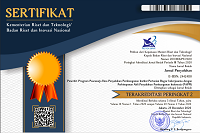Perilaku Masyarakat dalam Pelestarian Hutan Mangrove di Kabupaten Pangkep Provinsi Sulawesi Selatan
Abstract
Mangrove forest is one natural resource which essential for the life of living creatures that lives on its surrounding. The existence of mangrove forests has become an integral part of the lives of coastal communities; hence the existence of mangrove forests should be maintained and preserved. Mangrove forest sustainability cannot be separated from the behavior of the people who live around that forest. The objective of this research was (1) to examine the behavior of the coastal communities conserving mangrove forests, (2) to examine the factors related to coastal communities’ behavior in managing and conserving mangrove forest. The populations were the 100 heads of fisherman households taken from Tekolabbua and Pundata Baji Village of Pangkep District. This research was correlational research. This data was analyzed using Spearman Rank correlation by using SPSS programming. The result shows that the behavior of coastal communities in the preservation Pangkep mangrove forests is in the middle level. Factors related to this are behavior is the intensity of extension activities and environmental support.
Keywords: coastal community behavior, managing and conserving mangrove forests
Downloads
Authors who publish with this journal agree to the following terms:
- Authors retain copyright and grant the journal right of first publication with the work simultaneously licensed under a

This work is licensed under a Creative Commons Attribution 4.0 International License that allows others to share the work with an acknowledgement of the work's authorship and initial publication in this journal. - Authors are able to enter into separate, additional contractual arrangements for the non-exclusive distribution of the journal's published version of the work (e.g., post it to an institutional repository or publish it in a book), with an acknowledgement of its initial publication in this journal.
- Authors are permitted and encouraged to post their work online (e.g., in institutional repositories or on their website) prior to and during the submission process, as it can lead to productive exchanges, as well as earlier and greater citation of published work (See The Effect of Open Access).















